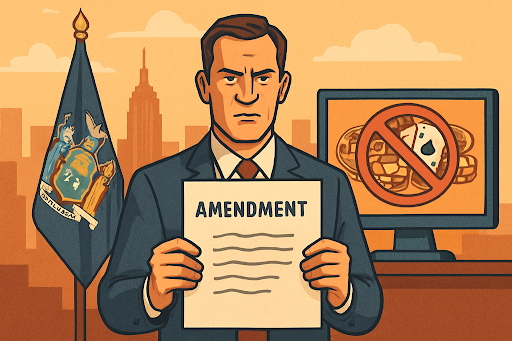SPGA Slams Amendment to New York Sweepstakes Ban Bill

Efforts by New York legislators to ban online sweepstakes games have drawn sharp condemnation from the Social and Promotional Games Association (SPGA), particularly following recent amendments to Senate Bill S5935A. The SPGA has described the latest revisions as “catastrophic,” arguing that they compound legal uncertainty rather than resolving industry concerns.
Expanded Language Raises Alarm
At the heart of the controversy is S5935A, a proposal spearheaded by Senator Joseph Addabbo, designed to eliminate digital sweepstakes-style games that use virtual currency systems resembling real-money gambling. The legislation specifically targets promotions that allow users to engage in games like simulated casino play, sports wagering, keno, or video poker, and later convert in-game currency into cash or equivalents.
The bill, introduced in March 2025, has steadily advanced through the Senate and recently reached its third reading—a procedural step before a full chamber vote. Its companion measure in the Assembly, Bill A6745 introduced by Assemblymember Carrie Woerner, features identical language and secured unanimous approval in the Assembly Racing and Wagering Committee.
If enacted, the proposed law would not only prohibit the operation of sweepstakes-based games but would also expand liability to a wide net of stakeholders, including vendors, content creators, financial services, and marketing affiliates. Violators could be penalized between $10,000 and $100,000 per violation and may risk suspension or denial of gaming licenses. Enforcement responsibility would be shared among the New York State Gaming Commission, state police, and the Attorney General’s office. All fine revenues would be redirected to the Commercial Gaming Revenue Fund for problem gambling prevention and education.
Amendment Shifts Key Definitions—and Raises New Concerns
In response to pushback, lawmakers made a significant adjustment to the bill by modifying how a “dual-currency system” is defined. Rather than providing a precise legal definition, the latest version of the bill defers that decision to the New York State Gaming Commission.
To the SPGA, this amendment does little to resolve underlying concerns and instead adds regulatory ambiguity. “This amendment is a clear acknowledgment that this anti-business bill needlessly threatens New York’s economy,” an SPGA spokesperson said. “But this amendment doesn’t fix anything. It’s a political patch meant to quiet critics without solving the underlying problem.”
According to the organization, this change could allow for broad and inconsistent enforcement that might endanger a wide range of operations, including loyalty programs, promotional campaigns, and mobile gaming applications.
Ripple Effects Across the U.S.
The SPGA has also criticized the bill’s development process, accusing legislators of bypassing necessary consultation with legal and industry experts. “Rather than collaborating with stakeholders and legal experts to craft thoughtful regulation, New York continues to advance a bill that threatens innovation and dictates to New Yorkers what games they can and can’t play on their phones,” the group stated.
The implications extend well beyond New York. Several other U.S. states are exploring similar legislation, with Louisiana recently advancing its own anti-sweepstakes bill, Senate Bill 181, which passed the state Senate unanimously. Louisiana’s proposal seeks to curb unauthorized sweepstakes and casino-style gaming, assigning oversight to the state’s Gaming Control Board and Department of Public Safety.
In Montana, Senate Bill 555, which contains comparable prohibitions, is awaiting the governor’s signature. Meanwhile, lawmakers in Illinois, Maryland, and Connecticut are reportedly evaluating their own versions of such laws. The SPGA warned these states to take heed of New York’s approach and the complications it has created. “Lawmakers wouldn’t be amending the bill if it didn’t need amending,” the organization observed. “New York legislators are publicly admitting the bill was flawed, and other states like Louisiana should take note before making the same mistake.”
SPGA Calls for Constructive Dialogue
While maintaining its strong opposition to the current version of the legislation, the SPGA reaffirmed its willingness to work with lawmakers to shape a balanced regulatory model. The association continues to support consumer protection measures that do not jeopardize digital promotions commonly used by major brands such as Starbucks, McDonald’s, and Marriott.
By calling attention to the real-world consequences of hasty rulemaking, the SPGA is urging states to consider more deliberate and collaborative approaches when addressing the complex nature of online promotional games.
Source: SPGA slams New York amendment to sweepstakes ban bill, LCB.org, May 5, 2025.







